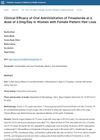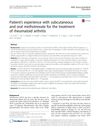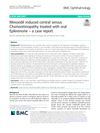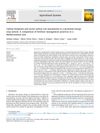Search
for
Sort by
Research
540-570 / 1000+ resultsresearch Minoxidil: Topical or Oral
research Application of Low-Dose Oral Minoxidil in the Treatment of Androgenetic Alopecia
Low-dose oral minoxidil can effectively treat hair loss.
research Low-Dose Oral Minoxidil in Female Patients With Lichen Planopilaris: Real-Life Experience

research Clinical Efficacy of Oral Administration of Finasteride at a Dose of 2.5mg/Day in Women with Female Pattern Hair Loss
Taking 2.5mg of finasteride daily can effectively improve hair loss in 62% of women, especially those pre-menopause or with less severe hair loss.
research First-In-Man Clinical Trial of the Oral Pan-AKT Inhibitor MK-2206 in Patients With Advanced Solid Tumors
MK-2206 was safe and effectively blocked AKT signaling in cancer patients, warranting more trials.

research Killing Two Birds with One Stone: Oral Tofacitinib Reverses Alopecia Universalis in a Patient with Plaque Psoriasis
A man with severe hair loss and skin disease regrew his hair with no side effects after taking tofacitinib.
research Dermatologic Adverse Events Associated With Afatinib: An Oral ErbB Family Blocker
Afatinib often causes skin problems that need proactive management.

research Inhibition of Skin 5α-Reductase by Oral Contraceptive Progestins In Vitro
Norgestimate is the most effective birth control progestin for reducing an enzyme linked to acne and excessive hair growth in women.

research Efficacy and Safety of the Oral Janus Kinase Inhibitor Baricitinib in the Treatment of Adults with Alopecia Areata: Phase 2 Results from a Randomized Controlled Study
Baricitinib is effective and safe for treating severe alopecia areata.

research The Safety of 52 Weeks of Oral DHEA Therapy for Postmenopausal Women
Taking DHEA for a year is generally safe for postmenopausal women but may cause acne and more facial hair without improving metabolism or aging.

research Evaluation of Clinical Adverse Effects and Laboratory Changes in Patients with Acne Vulgaris Treated with Oral Isotretinoin
Isotretinoin is safe and effective for acne, with common side effects like dry lips; serious side effects are rare.
research Studies of the components of an oral contraceptive agent in albino rats. I. Estrogenic component
In this study from 1980, albino rats were fed ethynylestradiol at doses 10 to 100 times higher than the human dose used in oral contraceptives for 2 years. The treatment resulted in dose-related estrogenic effects such as growth retardation, alopecia, liver enlargement, and increased survival rates. Female rats experienced uterine changes and gonadal atrophy, while males showed gonadal atrophy and an increased incidence of mammary tumors. Both sexes at higher doses developed liver neoplastic nodules and pituitary adenomas, but overall tumor incidence did not increase compared to controls. Interestingly, treated females showed a delayed onset and reduced potential for tumor development compared to control females.
research Studies of the components of an oral contraceptive agent in albino rats. II. Progestogenic component and comparison of effects of the components and the combined agent
In a study conducted on albino rats over 2 years, norethindrone acetate, a progestogenic component of oral contraceptives, was administered at doses 10 to 100 times higher than the human equivalent. The study found dose-related effects such as growth retardation, alopecia, and enhanced survival rates. Male rats experienced testicular and gonadal atrophy, while females showed uterine changes, increased adrenal gland weights, decreased ovarian weights, and ovarian atrophy. High doses led to liver enlargement and cystic mastopathy in both sexes, with females developing more uterine polyps and both sexes showing increased liver neoplastic nodules. Despite these changes, there were no significant differences in tumor incidence or development compared to untreated rats, and females exhibited a delayed onset of tumor formation.

research Patient’s Experience with Subcutaneous and Oral Methotrexate for the Treatment of Rheumatoid Arthritis
Methotrexate for rheumatoid arthritis often causes side effects like diarrhea, fatigue, and hair loss, especially at higher doses.
research Reduced Serum Vitamin B12 Levels During Oral Cyproterone Acetate and Ethinyl Estradiol Therapy in Women With Diffuse Androgen-Dependent Alopecia
Taking cyproterone acetate and ethinyl oestradiol for hair loss can lower vitamin B12 levels in women.

research Combination of Low-Dose Isotretinoin and Pulsed Oral Azithromycin in the Management of Moderate to Severe Acne
Low-dose isotretinoin combined with pulsed azithromycin cleared acne in most patients, with mild side effects.
research Disposition and Pharmacokinetics of [14C]Finasteride After Oral Administration in Humans

research Comparison of the Treatment Outcome of Oral Tofacitinib with Other Conventional Therapies in Refractory Alopecia Totalis and Universalis: A Retrospective Study
Tofacitinib works better and is more tolerable for severe alopecia than conventional treatments and DPCP immunotherapy.
research Weekly Azathioprine Pulse Versus Betamethasone Oral Mini-Pulse in the Treatment of Moderate-to-Severe Alopecia Areata
Weekly azathioprine pulse is a better alternative to corticosteroids for treating alopecia areata due to fewer side effects.

research Nail Involvement in Patients with Moderate-to-Severe Alopecia Areata Treated with Oral Tofacitinib
Tofacitinib improves nail conditions in patients with severe hair loss and does not affect hair regrowth.

research Non-Dietary Scurvy With Relapse Symptoms After Stopping Oral Vitamin C Supplementation
A 3-year-old girl developed scurvy symptoms that improved with vitamin C but relapsed when supplementation stopped.
research Comparative Efficacy Study of Combination of Oral Methotrexate and Prednisolone Versus Oral Methotrexate in Patients with Lichen Planopilaris
Methotrexate alone is as effective and safe as combining it with prednisolone for treating Lichen planopilaris.
research Efficacy of 2.5 mg Oral Biotin Versus 5% Topical Minoxidil in Increasing Nail Growth Rate
Minoxidil increases nail growth more than biotin.

research Minoxidil Induced Central Serous Chorioretinopathy Treated with Oral Eplerenone – A Case Report
Minoxidil can cause a rare eye condition, but it was successfully treated with oral Eplerenone in one case.

research A Pilot Study of the Efficacy in Treatment of Female Pattern Hair Loss Using 5% Minoxidil Solution Combined with Oral Chelated Zinc Supplement
Using 5% Minoxidil solution with oral chelated zinc supplement can effectively treat female pattern hair loss.
research Evaluation of the Efficacy and Toxicity of Oral and Topical Pumpkin Oil on the Hair Growth of Mice
Pumpkin seed oil promotes hair growth and improves hair texture without harmful effects.

research Effectiveness and Safety of Oral Dutasteride for Male Androgenetic Alopecia in Real Clinical Practice: A Descriptive Unicenter Study
Low input with cover crop optimizes yield and reduces greenhouse gas emissions.

research Hormonal Manipulation with Finasteride or Oral Contraception Does Not Influence Incidence of Renal Cell Carcinoma

research Glucocorticoid-Induced Side Effects Cause Oral Lesions in Systemic Lupus Erythematosus: A Case Report
Glucocorticoid treatment in lupus can cause oral lesions, which need early diagnosis and comprehensive care.